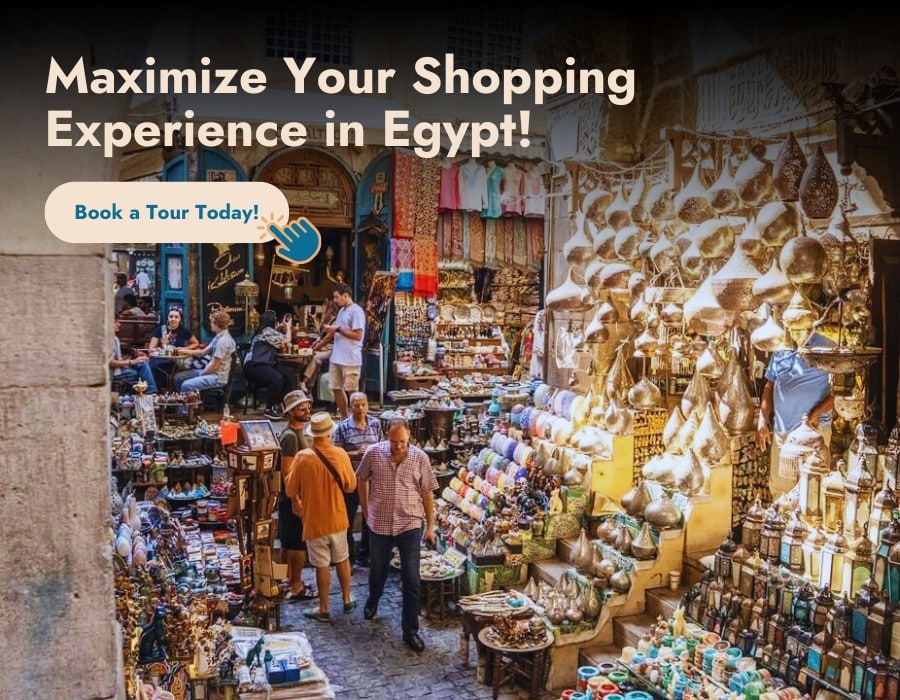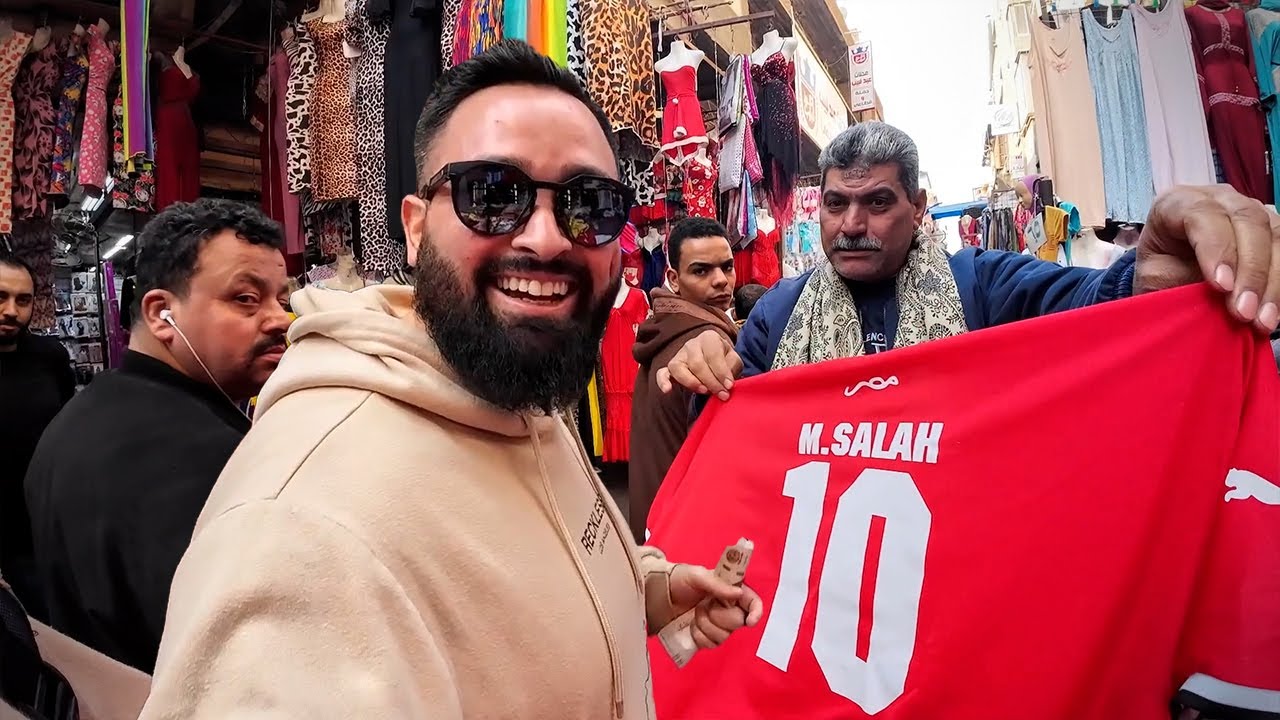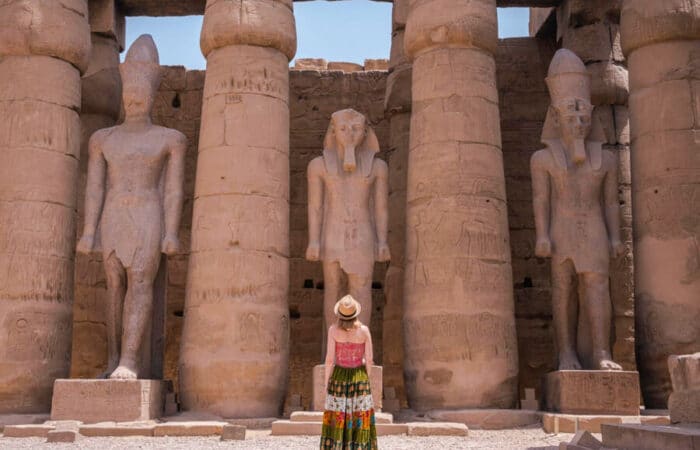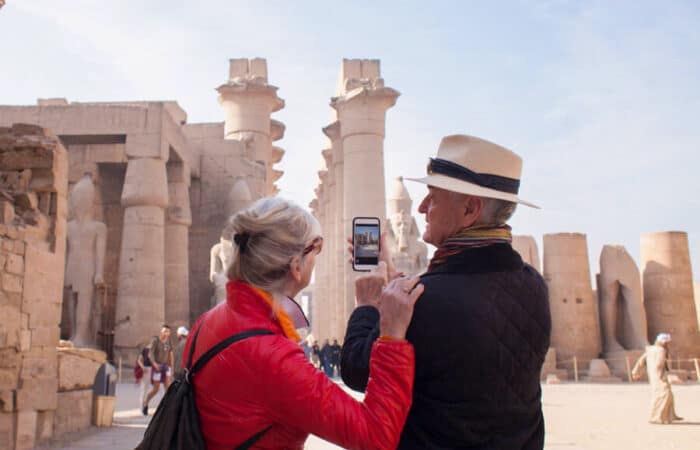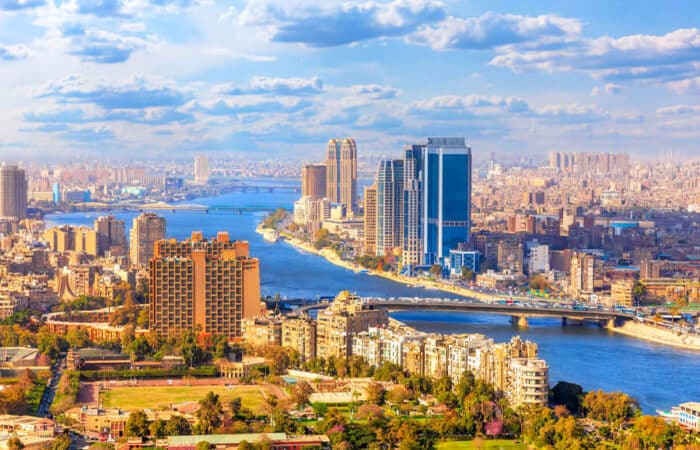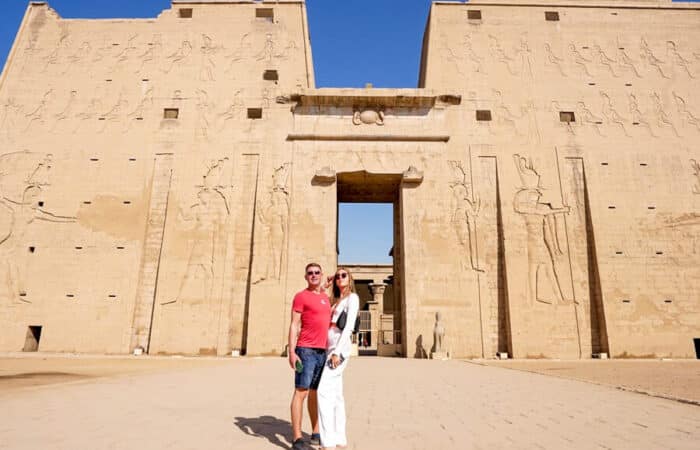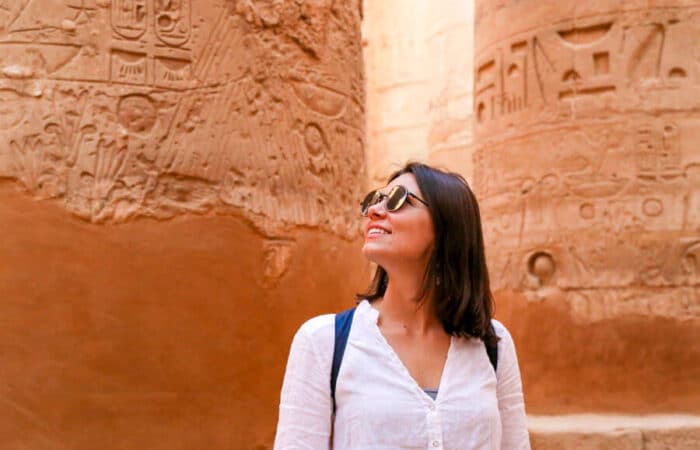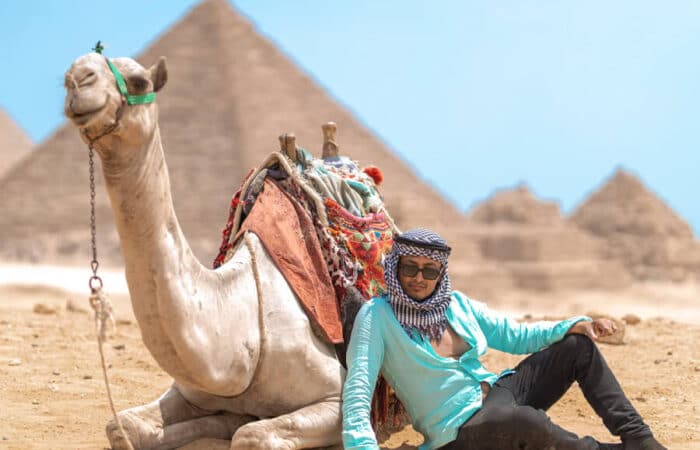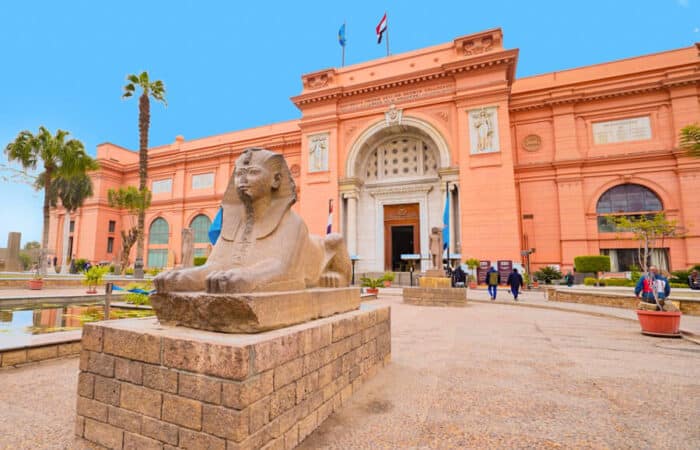Are you planning a trip to Egypt and wondering what to buy in Egypt as a souvenir? Egypt’s vibrant markets and bazaars offer a treasure trove of traditional handicrafts, spices, perfumes, and more. From the bustling alleys of Khan El Khalili in Cairo to the quieter artisan markets of Luxor and Aswan, shopping often becomes a highlight of many All-inclusive Egypt tours, where cultural experiences go far beyond sightseeing. But with so many options, how do you prioritize and find the best value? Read our complete 2026 guide to discover the top Egyptian souvenirs to bring home.
Key Takeaways
- Explore authentic items from Egyptian cotton to perfume oils and spices.
- Visit top markets: Khan El Khalili (Cairo), Luxor Spice Market, and the Aswan Souk.
- Bargaining is expected in most local markets.
- Carry cash and understand tipping customs.
- Avoid purchasing antiquities and ensure authenticity in metalware.
- Join guided shopping tours via Egypt Tours by Locals for a richer experience.
Introduction to Egypt Souvenirs
Shopping in Egypt is an adventure filled with culture, history, and sensory experiences. From the fragrant spice stalls of Aswan to artisan vendors in Luxor, each shop tells a story. Whether you’re buying textiles or a hand-carved figurine, your souvenirs will be more than mementos — they’ll be connections to Egypt’s timeless heritage.
Explore our Cairo Shopping Guide to get the most out of your experience.
Why Souvenir Shopping Matters in Egypt
Every market you visit in Egypt, from the tourist-heavy Khan El Khalili to the local bazaars in Aswan, offers a different taste of Egypt’s soul. These shopping experiences aren’t just commercial transactions—they’re cultural exchanges. Artisans pass on skills honed over generations, and each item you buy helps support local families and preserve Egypt’s craft heritage.
When you buy a hand-painted alabaster statue, you’re not just picking up a trinket. You’re taking home a piece of the local identity. That’s why we recommend approaching your shopping experience with curiosity and a willingness to engage with locals—ask questions, learn about the process, and understand the story behind what you buy.
Top 10 Souvenirs to buy from Egypt:
1- Egyptian Cotton Products

Egyptian cotton is not only a top export but also a testament to the country’s agricultural legacy. When you touch a genuine cotton product, you’re holding a thread of Egypt’s Nile-fed farming history. Soft, durable, and globally renowned, Egyptian cotton is ideal for bed linens, towels, and garments.
Pro Tips:
- Look for authentic labels like “100% Egyptian Cotton.”
- Compare prices between high-end stores and local textile markets.
- Bed linens and bath towels often offer the best value in terms of quality.
Where to Buy:
- Khan el-Khalili Market in Cairo for affordable options.
- Local textile markets in Cairo, Aswan, or Luxor for unique finds.
2- Perfume Oils and Incense
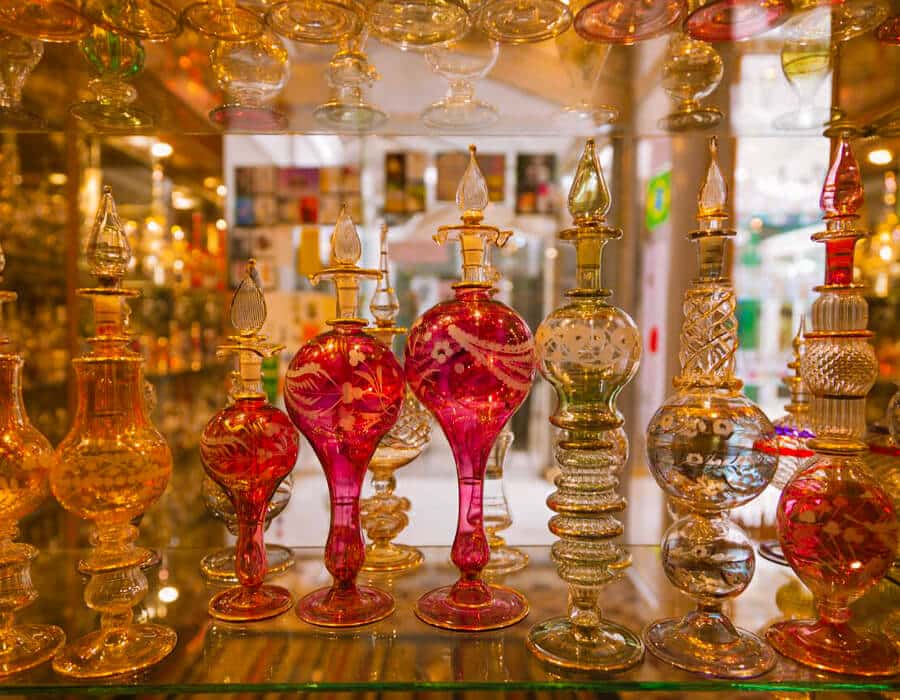
Egyptian perfumes are oil-based, long-lasting, and customizable. Many are housed in beautifully blown glass bottles. Perfume-making has been practiced in Egypt since Pharaonic times. Many stores today replicate ancient recipes that were once offered to gods and royalty.
Pro Tips:
- Ask for demonstrations to explore custom blends.
- Purchase from shops that offer certificates of authenticity.
- Glass bottles make great gifts; ensure they’re tightly sealed for travel.
Where to Buy:
- Khan el-Khalili Market, Cairo – Wide selection of fragrances.
- Perfume stores in Cairo and Aswan for rare scents.
3- Papyrus Art
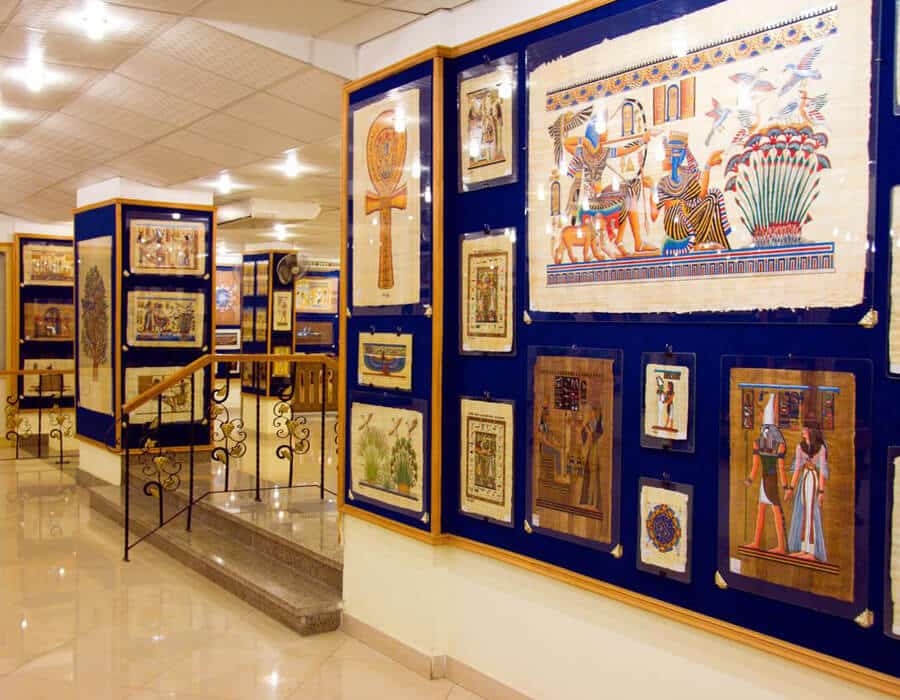
Made from the original ancient writing material, authentic papyrus makes a great decorative souvenir. Some workshops offer live demonstrations of how papyrus is made—watching the process is an educational experience in itself.
Pro Tips:
- Check the texture; authentic papyrus is flexible and has crosshatched fibers.
- Avoid synthetic replicas made from banana leaves or paper.
- Opt for hand-painted pieces for a unique touch.
Where to Buy:
- The Papyrus Institute in Giza for verified authentic items.
- Shops in Luxor for traditional designs.
- Artisan stalls in Aswan for hand-painted works.
4- Gold and Silver Jewelry
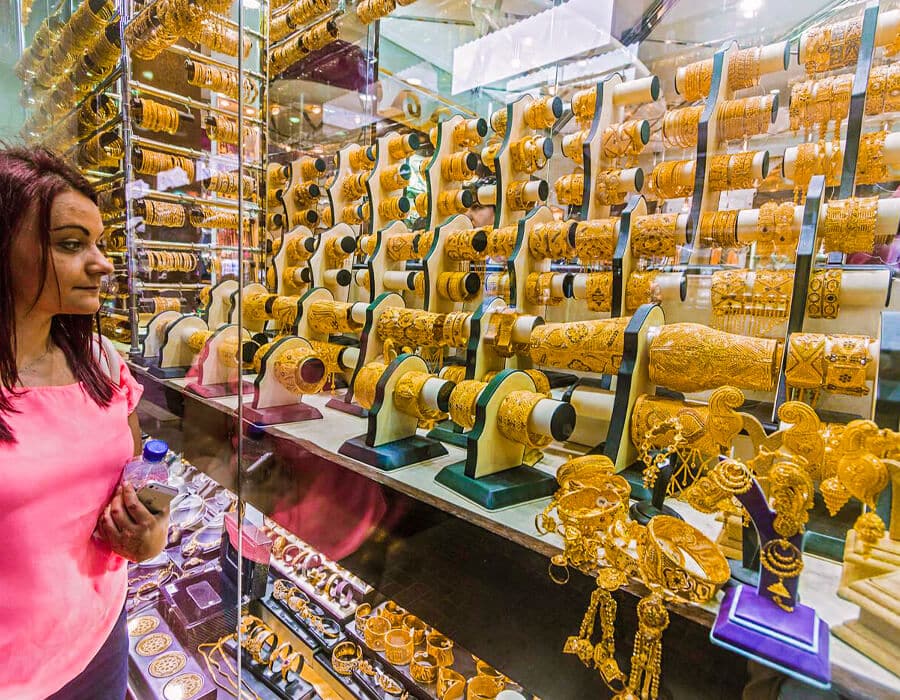
If you’re into jewelry, Egyptian gold and silver are top-tier. Think delicate, handcrafted pieces featuring ancient Egyptian symbols like the Ankh or Eye of Horus. I remember getting a gorgeous gold bracelet in Cairo that I still wear to this day—it’s one of those timeless pieces that never goes out of style. The gold here is also very pure, which makes it a great investment. You’ll find both modern and traditional designs, and many of the markets have jewelers who can even customize your piece.
Pro Tips:
- Look for hallmark stamps to verify authenticity.
- Invest in pieces featuring traditional symbols like the Ankh or Eye of Horus.
- Negotiate prices in markets but expect fixed rates in premium stores.
Where to Buy:
- Khan el-Khalili’s Gold District, Cairo for custom designs.
- Tiba Gold Market, Cairo for modern and traditional options.
- High-end jewelers like Al-Attar Jewelry, Cairo.
- Azza Fahmy stores for premium jewelry products.
5- Handcrafted Pottery and Ceramics
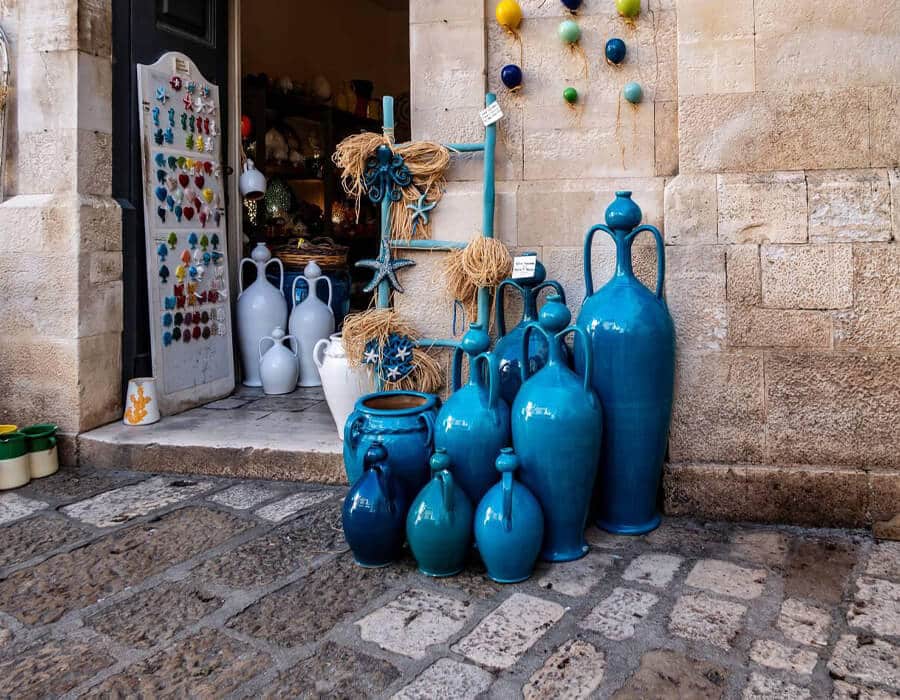
Another gem (no pun intended) is handcrafted pottery and ceramics. Whether it’s a beautifully glazed plate or a small vase, Egyptian ceramics are often hand-painted with traditional designs. I picked up a small, blue-and-white vase from Aswan, and it always catches people’s attention when they see it on my shelf. They’re usually inexpensive, so you can easily grab a few pieces as gifts. Just keep an eye out for cracks—authentic, handmade pottery is sometimes a little rough around the edges, but that’s part of its charm.
Pro Tips:
- Inspect for unique, hand-painted details.
- Opt for smaller items to ease transportation.
- Avoid mass-produced items; seek locally made crafts.
Where to Buy:
- Ceramic workshops in Fustat, Cairo (the pottery district).
- Markets in Aswan for authentic Nubian designs.
- Artisan co-ops near Saqqara for unique patterns.
6- Alabaster Statues and Carvings

Alabaster is another material with deep Egyptian roots, and the alabaster carvings and statues you find around Egypt are stunning. From small figurines to large, intricate carvings, these pieces make amazing souvenirs. I picked up a tiny carved figure of an Egyptian goddess during my visit to Luxor, and it’s one of my favorite travel memories. You can find these in pretty much every major tourist market, but make sure to check for authenticity by holding the piece up to the light—it should have a translucent quality.
Pro Tips:
- Test authenticity by holding it up to light—real alabaster is slightly translucent.
- Choose smaller pieces to avoid issues with luggage weight.
- Look for hand-carved designs to ensure uniqueness.
Where to Buy:
- Alabaster factories in Luxor for demonstrations and quality pieces.
- Shops in Aswan for authentic sculptures.
- Artisan stalls near the Valley of the Kings, Luxor.
7- Leather Goods
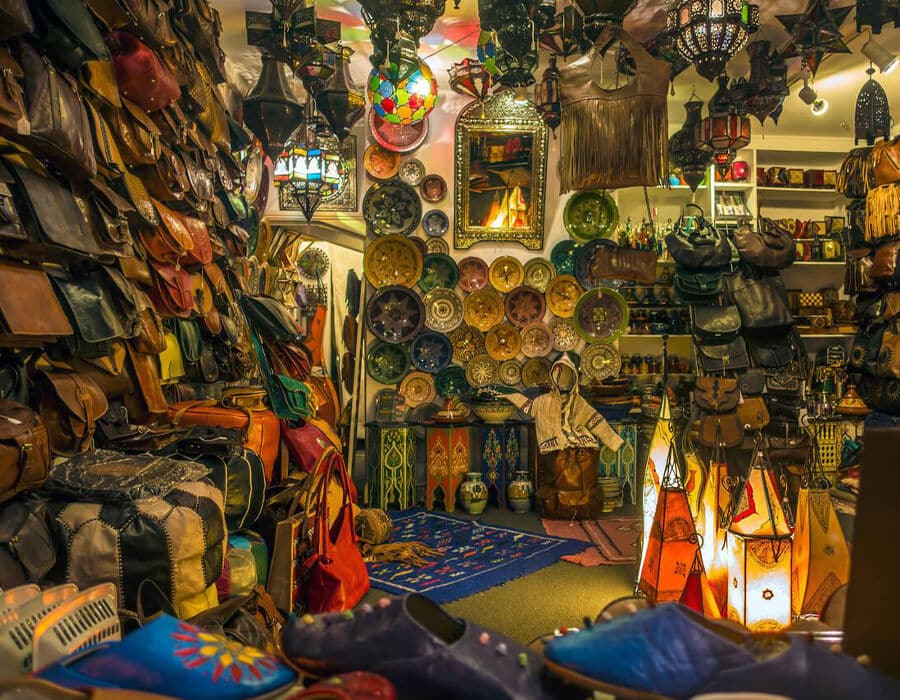
If you love well-crafted leather, Egypt is the place to be. From leather bags to sandals to wallets, the leather here is soft, durable, and beautifully made. The best part? Many of these items are made by local artisans who use traditional methods. I bought a leather bag in the Khan el-Khalili market that’s still holding up after years of use. If you’re into things that age well and get better over time, leather goods from Egypt are a must.
Pro Tips:
- Check the stitching and leather quality for durability.
- Opt for vegetable-tanned leather for an eco-friendly choice.
- Ask for handmade options to support local artisans.
Where to Buy:
- Khan el-Khalili Market, Cairo for affordable options.
- Leather workshops in Alexandria for bespoke designs.
- Boutiques in Downtown Cairo for higher-end products.
8- Spices and Herbs

You can’t visit Egypt without noticing the spices and herbs. The scent of cumin, coriander, and cinnamon is all around, and the markets are full of vendors selling their aromatic wares. A little bag of spices from Egypt makes for a unique gift, and they’ll also spice up your cooking when you get back home. I grabbed a small jar of Egyptian dukkah (a spice mix) during my last trip, and it’s been a staple in my kitchen ever since. Trust me, it’s worth the extra space in your suitcase.
Pro Tips:
- Purchase small quantities to keep spices fresh.
- Look for sealed packaging for transport.
- Popular spices: cumin, coriander, and dukkah (spice mix).
Where to Buy:
- Spice Bazaar in Aswan – A sensory delight.
- Spice Shops in Cairo for high-quality variety.
- Local markets in Luxor for fresher options.
9- Copper and Brassware
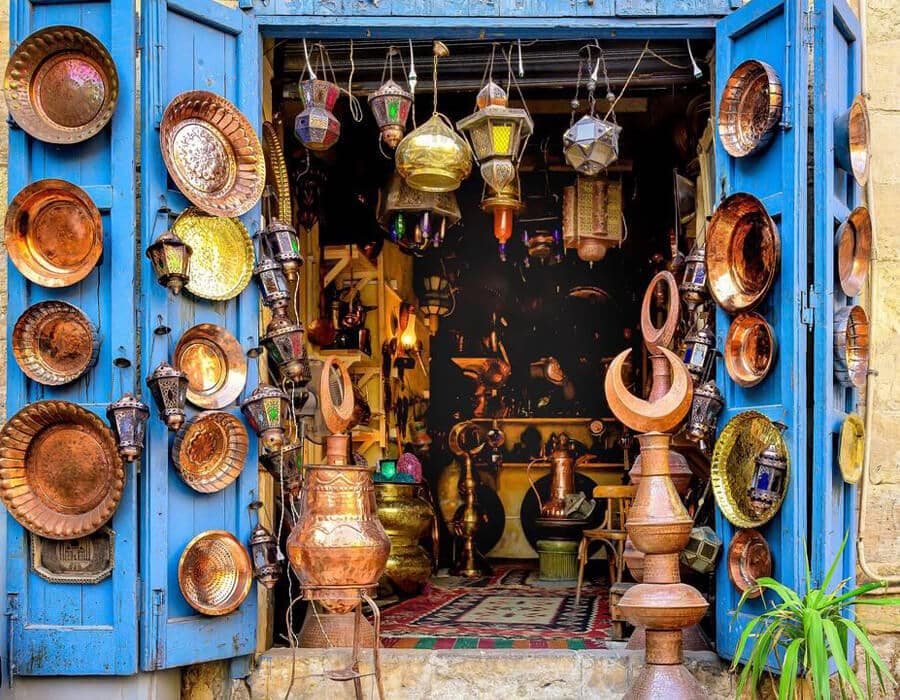
For something a little more vintage, look for copper and brass items. Think of intricately designed trays, pitchers, or lamps—these pieces have an ancient feel and often feature delicate engravings. I bought a beautiful brass tray in Alexandria, and every time I use it, I remember the bustling little shop I found it in. These items can be a bit heavy, so be mindful of your luggage space, but they make stunning keepsakes.
Pro Tips:
- Inspect engravings for fine craftsmanship.
- Be prepared to haggle, especially for larger pieces.
- Opt for vintage designs to add a rustic charm to your collection.
Where to Buy:
- Khan el-Khalili Market, Cairo for intricate designs.
- Workshops in Old Cairo for custom pieces.
10- Shisha Pipes
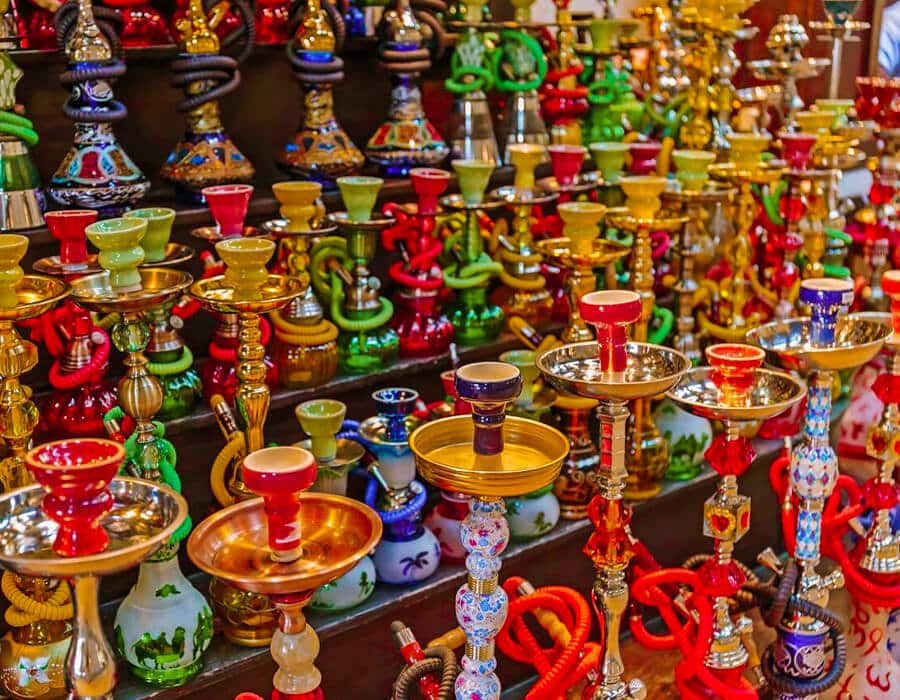
Finally, you can’t overlook the iconic shisha pipes—a traditional water pipe used for smoking flavored tobacco. Even if you’re not into smoking, a beautifully designed shisha pipe makes a striking piece of décor. I remember getting one with delicate silver accents, and it added such an interesting vibe to my living room. They come in all sizes, colors, and designs, and many are hand-painted or etched with intricate details.
Pro Tips:
- Choose hand-painted or engraved designs for a decorative piece.
- Opt for smaller sizes for easier transportation.
- Look for sets that include accessories like hoses and bowls.
Where to Buy:
- Khan el-Khalili Market, Cairo for variety.
- Stores in Giza near the Pyramids for premium designs.
- Artisan shops in Luxor for unique, handcrafted pipes.
Travel Tips for Shopping in Egypt
Shopping in Egypt is a unique experience—it’s not just about buying things, it’s about the journey of shopping itself and understanding the local market culture and etiquette. There’s so much to discover from the crowded bazaars to the quiet street vendors. But, navigating these markets can feel a bit tricky if you don’t know the ropes. So, here are some essential tips for shopping in Egypt that will help you have a smoother, more enjoyable time and maybe even save a bit of money along the way!
- Master the Art of Bargaining: The number one rule for shopping in Egypt? Haggle, haggle, haggle! In Egyptian markets, prices are rarely fixed, and a lot of shopkeepers expect you to negotiate. It can feel awkward at first, but trust me, it’s all part of the experience
- Always Carry Cash: While some larger shops in Egypt might accept credit cards, most of the smaller vendors and market stalls will only take cash. Make sure to carry small bills with you, especially when you’re in the markets. Egyptian pounds are the local currency, so make sure you have enough for spontaneous purchases.
- Take Your Time and Explore: Don’t feel rushed when shopping in Egypt. It’s easy to get caught up in the hustle and bustle of the market but take your time. Wander through the stalls and shops, look at different items, and enjoy the experience.
- Look for Local Markets for Better Prices: If you’re looking for better prices and fewer tourists, try exploring local markets outside of Cairo, like in Aswan or Luxor. These markets are typically quieter and offer a more authentic shopping experience, where you can sometimes find items for a fraction of the price you’d pay in more tourist-heavy areas.
- Be Ready for Some Salesmanship: In Egyptian markets, you’ll find shopkeepers who are pretty persistent when it comes to making a sale. Don’t take it personally if someone seems too pushy—they’re just doing their job. But if you’re not interested, just politely decline.
Pro Tips when purchasing these items:
| Item | Purchasing Advice |
|---|---|
| Gold and Silver Jewelry | Check for purity stamps and current gram prices, which are published daily in the Egyptian Gazette. |
| Perfumes | Understand dilution ratios to ensure you’re purchasing high-quality essences, not imitations. |
| Spices | Be cautious of saffron substitutes, such as safflower, which are sold at significantly lower prices. |
| Antiquities | It is illegal to purchase real antiquities or ivory in Egypt, so it’s best to avoid these items altogether. |
FAQs About Souvenirs from Egypt
1- What’s the best thing to buy in Egypt?
One of the best things to buy in Egypt is authentic papyrus art. These scrolls are made using traditional methods and often feature intricate depictions of gods, hieroglyphics, or scenes from ancient Egyptian mythology. Egyptian cotton products, such as luxurious bedding or clothing, are also top choices due to their exceptional quality and global reputation.
2- What is a special gift from Egypt?
A personalized cartouche pendant is a truly special gift from Egypt. These unique jewelry pieces, engraved with a name in hieroglyphics, carry deep cultural significance and connect the wearer to ancient Egyptian history. They make a thoughtful and memorable present.
3- Are Egyptian souvenirs expensive?
Egyptian souvenirs are generally affordable, but the price depends on the material and craftsmanship. Handmade items like alabaster figurines or finely woven rugs can be more expensive due to their quality. Bargaining is expected in most markets, so you can often secure a good deal.
4- What are the famous gifts in Egypt?
Famous gifts from Egypt include scarab amulets, handwoven rugs, papyrus scrolls, and traditional perfumes in ornate glass bottles. These items are iconic representations of Egypt’s rich culture and make excellent souvenirs or gifts for loved ones.
5- Where to Shop & buy souvenirs in Egypt?
For authentic Egyptian items, visit the Khan El Khalili market in Cairo, which is renowned for its wide array of handmade goods. In Luxor and Aswan, local workshops and certified vendors are excellent places to find genuine alabaster, spices, and traditional crafts. Always look for demonstrations or certificates to ensure authenticity.
6- What can I not bring back from Egypt?
When shopping in Egypt, it’s important to be aware of restrictions on what you can and cannot bring back home. Antiquities are strictly prohibited from export under Egyptian law. This includes ancient artifacts, statues, and coins—even if they appear to be sold legally, purchasing and attempting to export them can lead to severe penalties.
Additionally, ivory products and items made from endangered species are illegal to buy or take out of the country due to international wildlife protection laws. Be cautious with items that look like genuine ivory or animal skins.
For food items, while spices are usually fine, avoid bringing back large quantities of fresh produce or seeds, as these may violate customs regulations in your home country. Always check your country’s customs guidelines for specific rules regarding agricultural products.
Finally, avoid fake or replica antiquities labeled as souvenirs, as some countries have strict rules against importing replicas that mimic ancient artifacts. Stick to certified markets and vendors to ensure your purchases comply with the law.
Conclusion: Bringing a Piece of Egypt Home
Shopping in Egypt is about more than just buying goods — it’s about connecting with the country’s deep history and vibrant traditions. Each item you bring home becomes a personal artifact of your journey. Support local artisans, cherish authentic craftsmanship, and shop responsibly.
Remember: when you buy handmade souvenirs, you’re preserving cultural heritage and creating a deeper connection to the country you’re visiting.
For curated experiences, explore our Cairo private tours that include guided visits to top markets.
Don’t miss to check:
- Best Tours to Egypt from USA
- Egypt Travel Packages from Dubai
- Best Luxury Egypt Tours Packages
- Egypt Honeymoon Tours
- Egypt Private Tours
- Best Egypt Itinerary 8 Days
- Ultimate Egypt Itinerary 14 Days
- Half-Day Tour to Pyramids of Giza
- Cairo Pyramids Tour – Pyramids, Memphis and Sakkara
- Day Trip to Giza Pyramids & GEM Egyptian Museum
- Cairo City Tour – Pyramids, Citadel with Khan El Khalili
- City Trip Cairo – Pyramids, Museum, and Khan Al Khalili

